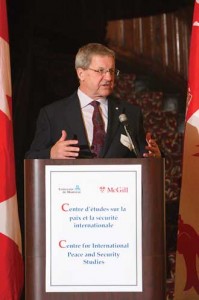
Axworthy cites power of ideas in inaugural speech
By Pascal Zamprelli
Ideas matter because they can change the world, and universities matter because they are the birthplace of ideas.
That was the principal message delivered on Monday by Lloyd Axworthy, Canada’s former Minister of Foreign Affairs and a global leader in human security, as he helped inaugurate the Centre for International Peace and Security Studies, a joint initiative of McGill and l’Université de Montréal.
Axworthy, who was instrumental in major international security initiatives, including the Ottawa treaty on landmines for which he earned a nomination for the 1997 Nobel Peace Prize, emphasized the role of ideas in policy-making. “What is the role of universities in assisting public policy?” asked Axworthy, who now serves as President of the University of Winnipeg. “Our responsibility as those in the academy is to help – help policy makers make informed decisions, and help them see where we are going, as opposed simply to where
we have been.”
To demonstrate how the power of ideas can lead to visionary policy, he used the example of the Responsibility to Protect, an international concept that restricts state sovereignty by placing an obligation on
states to protect their own people, or face international intervention. Canada proposed the idea early in the new millennium, and it has grown in popularity since, as defending people, as opposed to borders, becomes central to the notion of international security.
“There is [an example of] how an idea at the beginning of the decade is now gaining traction at the end of the decade,” Axworthy said. “It’s the most important revision of state sovereignty in 360 years. Canada did that!”
Citing both universities’ tradition of leadership in idea generation, he expressed great hope in the new Centre’s potential.
T.V. Paul, James McGill Professor of International Relations, will co-direct the Centre along with Prof. Michel Fortmann of UdeM. Their goal, he said, is to strengthen research and teaching in this important area, and contribute to the larger aim of “achieving a world order without major violence.”
